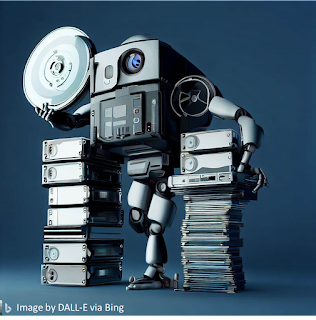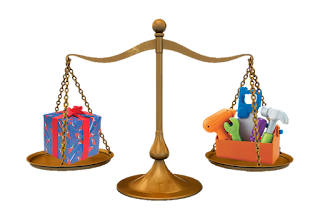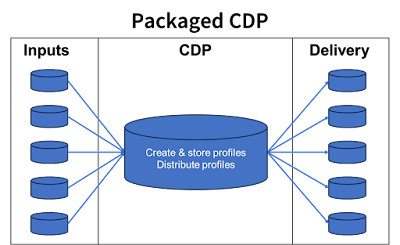Like everyone else in martech land, I�ve been pondering the future of marketing in a world populated with AI. Most research I�ve seen agrees with this Hubspot report� that marketers� top application for generative AI has been content creation...
Like everyone else in martech land, I�ve been pondering the future of marketing in a world populated with AI. Most research I�ve seen agrees with this Hubspot report� that marketers� top application for generative AI has been content creation (48%), followed closely by data analysis (45%) and learning how to things (45%). So it�s fairly clear that the immediate impact of AI will be to let marketers create vastly more copy, including real-time messages tailored to specific individuals.�
Extending this a bit, we can expect those real-time messages to be delivered within ever-more-finely tailored campaign flows (something else that AI can easily generate) or without formal campaign structures at all. These messages will be orchestrated and optimized across all channels, fulfilling the omnichannel vision that has hovered like a mirage on the industry horizon for decades.�
(Whether this results in more or fewer martech applications is a separate question. I tend to agree with this GP Bullhound study, which argues that �Any application introduced as an AI-enhanced alternative to an existing application or as a feature to a platform will likely become redundant when that incumbent platform implements the same AI features.�� This suggests that fewer specialist martech products will be needed, since truly new applications are relatively rare. Moreover, the productivity benefits of integrated suites are magnified when AI can easily orchestrate tasks within the suite, but not those on the outside. And, AI systems are inherently more adaptable than traditional software, which must be explicitly programmed for each new task. So extending existing applications becomes easier when AI enters the picture.)
Of course, what the humans reading this piece really care about is the role that they will play in this AI-managed universe. (Come to think of it, the AIs reading this may also care more than we know.) We�re frighteningly close to living the old joke about the factory of the future, where the one human employee's job is to feed the dog, and the dog's job is to keep the human away from the equipment.�
The conventional answer to that question is that humans will still be needed to provide the creative and emotional insight that AIs cannot deliver. (That�s what ChatGPT told me when I asked.)� Frankly, I don�t buy it: just as people who can fake sincerity, have it made, the AIs will quickly learn to mimic creativity and find which emotion-based messages work best.
Still, let�s be a bit optimistic and assume the marketing department of the future includes one human whose job is to feed the AI. Let�s even assume that human adds some creative and emotional value. The net result across the marketing industry as a whole will be that every company produces a wonderfully high and consistent level of marketing outputs. While that�s great in many ways, it also means that better marketing will no longer be a competitive differentiator. It�s a repeat of the situation in manufacturing since the 1970�s, when quality best practices were applied everywhere, so the differences between the best and worst products were often too small to matter. The winners in that world were companies who could use marketing to differentiate what in fact were commodity products. But when AI lets every company produce great marketing, then marketing itself is also a commodity.
So, how will companies compete in this new world? I�ve already argued it won�t be through emotional insight or creativity. I briefly thought that people might do better than machines at adapting to rapid change. The theory was that AI can only be trained on historical data so it will flounder when faced with unexpected events � which are increasingly common. But, let�s face it: humans also flounder in the face the unexpected.� It�s not at all clear they�ll be better than machines at predicting abrupt change, recognizing changed circumstances, collecting new evidence, and finding the new best actions. In fact, humans are heavily biased in favor of making decisions based on past experience, so I�d probably bet on the AI.
But all is not lost. I still see two ways for companies, and the humans who run them (for now), to distinguish themselves.
The first is customer experience. If you consider the true commodity industries, such as telecommunications, air travel, hotels, and financial services, what makes customers loyal to one or another provider is rarely the actual product or price. Rather, it�s the way they are treated. As a baseline, customers expect reasonable service, delivered pleasantly. But loyalty is really won or lost when there�s a problem or special request. This gives the company a chance to distinguish itself, either against an actual competitor or against a customer�s expectations of how they should be treated.�
Company policies and systems play a large role in what�s possible, but ultimately it�s the front-line employee whose training, attitudes, and choices make or break the experience. In the future, AI will surely play a larger role in managing these interactions. But, as with marketing, this will yield largely similar results because companies will be using similar AI systems. The differentiator will be the company�s people.
That's good to know, but customer experience is rarely under marketers� direct control. This leaves one final straw for them to lean on: the data used to train their AIs.
Remember, AI programs themselves will be widely available. As with any other technology, the difference in results will depend on how they�re used, not any difference in the technology itself. Once AI systems are fully deployed, most decisions about things like content and program design will be made by the system, limiting the impact of user choice on the outcomes. But the one thing that will remain under users� control is the data fed into the AI systems. It�s differences in that data that will drive differences in outcomes. In short: whoever has the best data, wins.
This is an area where marketers have a major role to play. They may not control the various internal and external systems who provide customer data. But they will have a large say in what those systems feed into the primary customer data store which, in turn, will feed the AI. Marketers who select the best data feeds will have a more effective AI and, thus, better final results. This will be true even though AI makes data collection easier: that will reduce the technical barriers to data gathering at all companies, but most barriers are actually organizational and budgetary. Those are company-specific decisions whose outcomes marketers can affect.
This may not be the cheeriest news you�ve heard today. Few marketers chose their career because they wanted to fight political battles with IT and customer success teams. But it does mean that many marketers can continue to play a major role in the success of their organizations, even as most of the traditional marketing tasks are taken over by AI. No doubt, the marketers who remain employed will sneak a few of their creative and emotional insights into AI prompts.� Maybe their inputs will even make a positive difference. But what will really matter is how good a job they do at feeding the AI with the best possible data.� That's what will empower it to deliver better results than the competition.
Remember: in a world run by AI, the best data wins.









